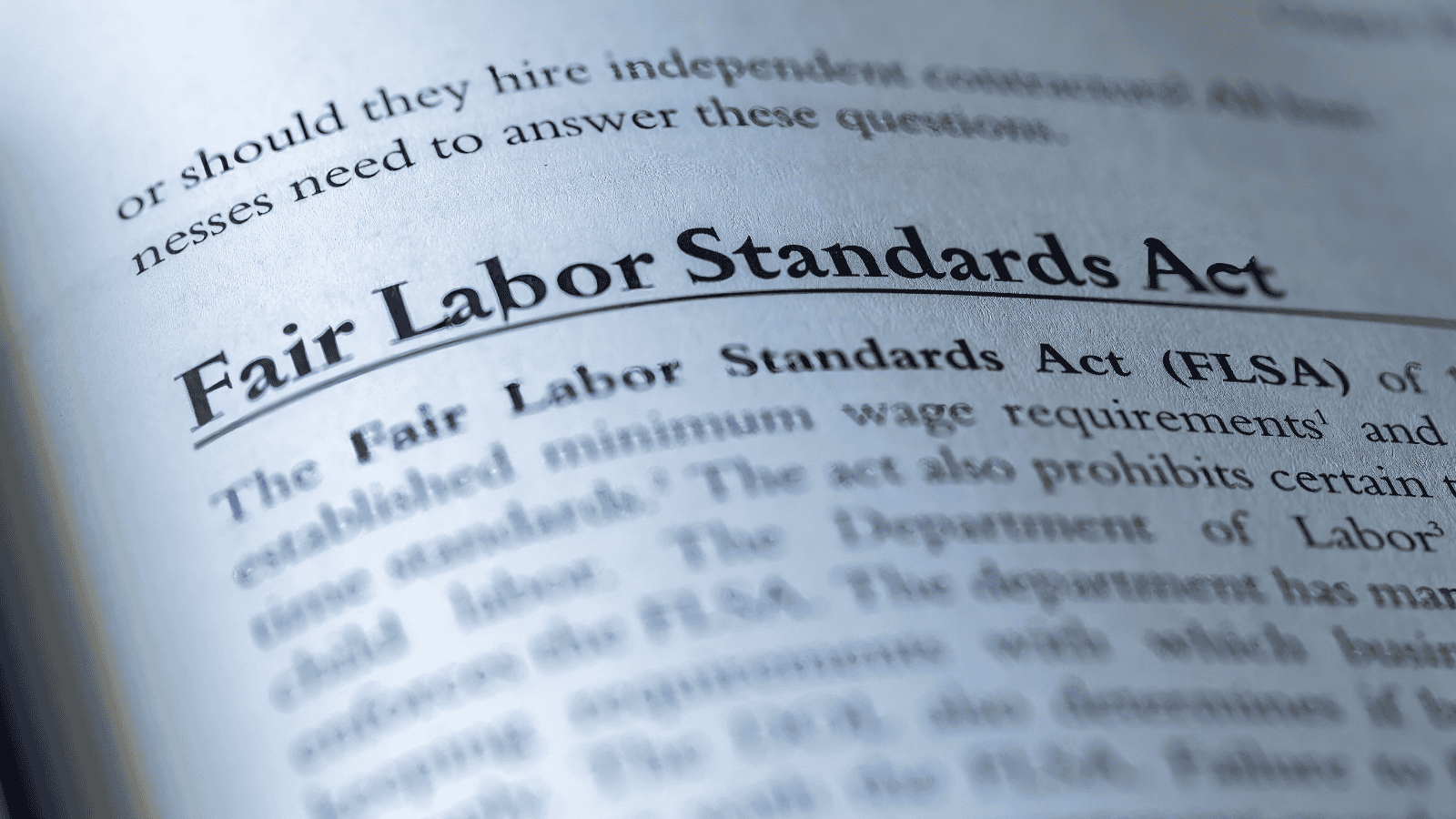Introduction to Running an FLSA Audit
Introduction to running an FLSA audit Are you curious about running an FLSA audit but not sure where to start? Well, you've come to the right...
Discover our wide range of courses designed to help you maintain compliance with Prevailing Wage and other labor laws
Join our upcoming events to ensure seamless compliance with Prevailing Wage and other essential labor laws
Discover how our services can assist you and your company in staying compliant with Prevailing Wage.
Explore the resources we offer, providing quick guidance on a wide range of topics

In the HR department, acronyms are as common as coffee breaks. If you're new to the field or are curious about the jargon most often used, then you've come to the right place. Today, we're diving into the FLSA, a seemingly niche topic that holds so much importance in HR discussions. Strap in and get ready for a crash course on one of the most crucial regulations in employment law!
The Fair Labor Standards Act (FLSA) is a crucial piece of legislation that plays a significant role in shaping the landscape of labor rights and standards in the United States. Enacted in 1938, this federal law sets forth guidelines for minimum wage, overtime pay, child labor regulations, and recordkeeping requirements.
One of the primary purposes behind the FLSA is to ensure fair compensation for employees. It establishes a federal minimum wage rate to which employers must adhere, currently set at $7.25 per hour. Additionally, it requires employers to provide overtime pay at one-and-a-half times an employee's regular rate for any hours worked beyond 40 hours per week.
Furthermore, the FLSA includes provisions regarding child labor restrictions. It establishes age limits for certain types of work deemed hazardous or detrimental to young workers' health and safety.
To enforce compliance with FLSA regulations, the Wage and Hour Division (WHD) of the U.S. Department of Labor has been given authority. Employers found violating these provisions may face penalties, in addition to back wages owed to employees, and potential fines.
Understanding and adhering to FLSA guidelines is essential for HR professionals as they navigate employment practices within their organizations while ensuring fair treatment of employees when it comes to wages and working conditions.
The Fair Labor Standards Act (FLSA) was enacted in 1938 with the goal of protecting workers' rights and ensuring fair labor practices. Its main purpose is to establish minimum wage, overtime pay, recordkeeping, and child labor standards for employees in both private sector and government jobs.
Before the introduction of the FLSA, many workers faced exploitative conditions, such as long hours without proper compensation or protection. The Great Depression highlighted these issues and led to a widespread demand for change.
Under the FLSA, employers are required to pay eligible employees at least the federal minimum wage for all hours worked. Additionally, non-exempt employees who work more than 40 hours in a week must receive overtime pay at a rate not less than one-and-a-half times their regular hourly rate of pay.
Over time, amendments have been made to expand the coverage of the FLSA and address emerging issues related to employment practices. These changes have helped adapt the legislation to modern workforce dynamics while maintaining its original intent.
Today, HR professionals play a crucial role in ensuring compliance with FLSA regulations within organizations. They must stay updated on any revisions or new interpretations of FLSA provisions by regularly consulting resources such as the Department of Labor's Wage and Hour Division.
Understanding the purpose and history behind the FLSA helps us recognize its significance in shaping fair labor standards that protect employees from exploitation while providing guidelines for employers to follow. Compliance with these regulations is essential for HR departments seeking to create an equitable work environment where everyone receives fair compensation for their contributions.
The Fair Labor Standards Act (FLSA) is a crucial piece of legislation that sets the standards for minimum wage, overtime pay, and child labor in the United States. Understanding its key provisions is essential for HR professionals to ensure compliance and protect both employees and employers.
One important provision of the FLSA is the requirement for employers to pay their employees at least the federal minimum wage, currently set at $7.25 per hour. However, some states have their own higher minimum wage rates which must be followed.
The FLSA also mandates that non-exempt employees who work more than 40 hours in a workweek are entitled to receive overtime pay at a rate not less than one-and-a-half times their regular rate of pay.
Another significant provision relates to child labor restrictions. The FLSA prohibits employing children under specific ages in hazardous occupations or during certain hours deemed inappropriate for their age group.
Furthermore, the FLSA establishes guidelines regarding maintaining accurate records for employers. It stipulates that accurate records must be maintained on each employee's wages, hours worked, and other relevant information.
Understanding these key provisions of the FLSA is vital for HR professionals to ensure compliance with federal labor laws and maintain fair working conditions within their organizations. Have more questions around the FLSA? Contact Onsi Group today!
- Aaron Ramos, Labor Compliance Officer

Introduction to running an FLSA audit Are you curious about running an FLSA audit but not sure where to start? Well, you've come to the right...

Understanding A FLSA Audit Is your business compliant with the Fair Labor Standards Act (FLSA)? If you're not sure, it's time to consider conducting ...

What is an FLSA Audit? Are you confident that your business is compliant with the Fair Labor Standards Act (FLSA)? If not, it's time to consider...